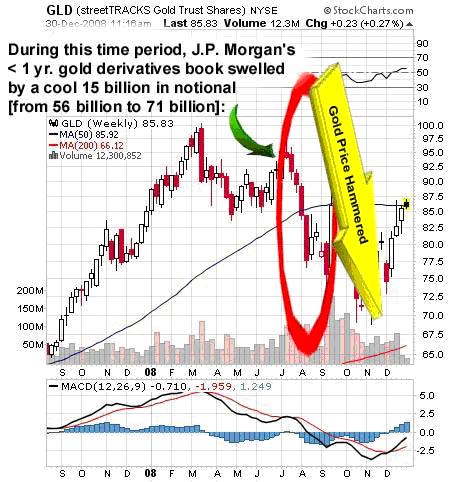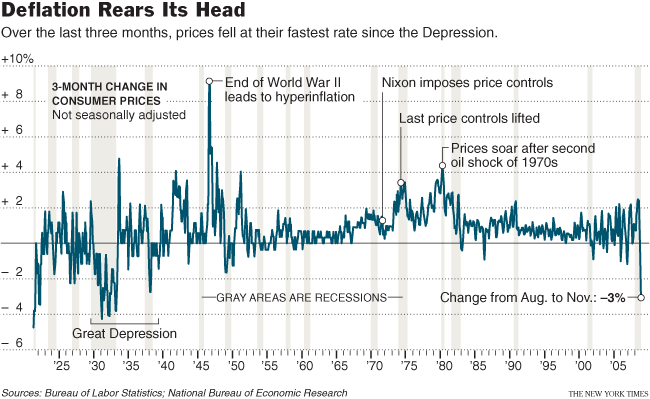Archive for the ‘investing’ Category
“Better” Than the Third World…
Nice summary by Eric Jantszen:
Bribery in third world countries goes on under the table, behind closed doors, hidden from nosy journalists. In the U.S. bribery of public officials occurs in broad daylight, paid out as speaker’s fees and advisor’s compensation.
I know, I know. You don’t want to hear this. The crisis passed. Green shoots and all that. Jon Stewart’s dressing down of Jim Cramer? Dismissed. The assertion by Bill Black, the senior federal savings and loan regulator during the S&L crisis, to Bill Moyers that the current banking crisis is “1000 times worse, perhaps, certainly 100 times worse, than the Savings and Loan crisis” yet no one has been prosecuted? Forgotten. The revelation from Simon Johnson, Director of the Research Department at the IMF and Sloan School of Management at MIT Professor of Entrepreneurship, that the U.S. is not run by either Republican or Democratic parties but by a American bank oligarchs?
Senator Dick Durbin, who has used his inside information to trade the market, has publicly stated the truth on the matter
“And the banks — hard to believe in a time when we’re facing a banking crisis that many of the banks created — are still the most powerful lobby on Capitol Hill. And they frankly own the place.”
Anytime you trade, you are trading against this inside info and corruption. When you lose you lose. When you win you get taxed, and your funds still end up in the hands of the corrupt bankers and investment firms like Goldman Sachs.
It’s better than the third world. Up until the point it isn’t!
Debt is Accounting, Not Reality
Barry Ritholtz highlighted a great downloadable PDF from Jeremy Grantham of GMO titled The Last Hurrah and Seven Lean Years
It is well worth a read, but here are a few great highlights from it
- “Debt is accounting, not reality. Real economies are much more resilient than they are given credit for.”
- Attempts at economic stimulation tends to stimulate the stock market more than the economy because it trades off momentum & a multiplier effect.
- “Since 1932, in the third year of the Presidential Cycle, the average S&P 500 return (from October 1 to October 1) is 22 percentage points ahead of the average of years one and two! And this is statistical noise? Year three is the time when, driven by politics, financial stimulus and moral hazard are applied so that the economy – particularly increases in employment – can be a little stronger in the run-up to the election in year four.”
Stealing Money for Me – Quote of the Day
I was chatting with a friend yesterday and he said:
“Once I saw the PPIC from Geithner, I decided to channel my anger, and I bought a bunch of bank stocks. So now I can be happy knowing that the govt is stealing money FOR ME, instead of just FROM me”
He really captures the spirit of our free market capitalism.
I pledge allegiance
to the banks
of the United States of America,
and to the interest for which it stands,
one nation under debt, indefinitely,
with brazen looting & slavery for all.
Insider Trading?
Banks scammed consumers buying homes through predatory lending and illegal appraisals, artificially boosting home prices. Those who were smart enough to stay out of that game lost financial power to inflation caused by the creation of trillions of dollars in false wealth.
The real estate bubble burst. Banks essentially stopped lending to each other because they no longer trusted each other’s books. So the banks needed bailed out for engaging in risky bets. To stop the financial melt down US taxpayers were fleeced of hundreds of billions of dollars to bail out those same banks. Such a move is/was cause for concern, causing many investors to want to diversify out of U.S. Dollars and invest in commodities like gold (one friend said he was buying dry food and has a gun!)
Some banks, like J.P. Morgan, used the fleeced taxpayer money to short hot commodities like gold, cratering the price of gold.

With many central governments having budget shortfalls and fast declining economies (even with record low interest rates) many may need to sell their gold stakes.
No matter where you put capital, your money is being used against you – unless you are a bank. 🙂
This reminds me of how the US government gave defense contractors classified information so long as they would go on TV and lie to the US public, selling the Iraq war.
Volatility & Footprint Size Lead to Marketplace Inefficiency in Leveraged Derivative Trades
Eric Oberg ran a 2 part series explaining why the returns on many double leveraged EFTs are less than one might expect.
The leveraged trades against the S&P 500 represent a small amount of volume compared to the EFT volume short financials or real estate (like SRS)..thus the trades against more liquid indexes do a better job of tracking their goal (of providing a leveraged mirror of what happened in the marketplace). In the smaller markets the derivative leveraged trades create a lot of marketplace volume that can overshadow the market and dislocate capital.
If someone buys that short-sided ETF from a market maker, the market maker does not really have “the other side” to mitigate his risk, thus he either waits for someone to unwind a pre-existing position or he goes out and shorts the underlier. This puts pressure on the underlier, which creates more interest in being short. This, magnified by the leverage, magnifies the volatility, which magnifies the negative convexity, which eats into returns. Thus the “savvy trader” who thinks he or she is doing a “smart trade” is contributing to his or her own underperformance while still having the right idea — the wrong execution of the right concept.
US Real Estate & Deflation: Why is SRS Near 52 Week Lows?
Massive Deflation?
I am new to investing (outside of investing in websites we own and operate) but some stuff that happens in the market simply does not make much sense to me. We have deflation rates that have not yet been seen since the Great Depression.

via the NYT
Real Estate Deflation
While the real estate market is already down about 25% from its peak, experts like Robert Shiller believe it still has a ways to go.
- On a historical basis, US residential real estate prices are still way above normal averages (if you compare rent price to sale price or sales price to median home income – lots of research in this PDF)
- the future of commercial real estate is looking grim, with consumers cutting back on spending
- and there is going to be a ton of Alt A and ARM mortgages resetting in the next couple years
Shouldn’t Real Estate Deflate?
So if we are seeing rising unemployment, a contraction of credit, and are in for massive deflation, then an asset class that is still well above its historical prices (like residential and commercial real estate) should be easy to trade against, but for some reason (maybe the US government backstopping incompetent companies – and fears of more of the same?) that trade has been a failure in the current market. ProShares UltraShort Real Estate (SRS) is a leveraged fund that “seeks daily investment results that correspond to twice the inverse daily performance of the Dow Jones U.S. Real Estate Index,” but it reached fresh 52 week lows only 2 days ago, traded up yesterday, and then gave back most of those gains today.
There can be a small decay rate associated with such leveraged funds that can cause them to lose out on some growth, but it should not be so much that real estate backed assets are seemingly increasing in value.
Commercial real estate firm Simon Property Group (SPG) has a price to earnings ratio over 30 (50% higher than Google’s!!!) while ShopperTrak reports foot traffic in malls is down 17.9% year on year.
Refinancing Rising, but Few New Home Purchases
People have not been buying many new homes, but mortgage refinance is up sharply on lower interest rates.
How Much Inflation Can the Fed Create Before US Bond Yields Rise?
Longterm treasury bond yields are exceptionally low, killing trades against it – like TBT. The US Dollar has been sliding hard against the Euro recently, and the is planning on using inflation to help stimulate the economy. How far can they push this string?
Chicken or the Egg?
With the US recycling money (and attempting to inflate the crap out of it) to prop up an overpriced asset and stimulate the economy, either real estate or treasuries will eventually get killed…though I am not smart enough to know which bubble has further downside in the short run, and was recently on the wrong side of a trade/bet against the fed.
Are those trade so obvious that there is no opportunity left? How long can the market deny fundamentals? How steep is the market decline when it does happen?